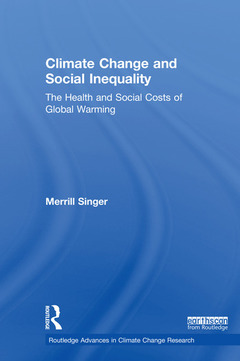Description
Climate Change and Social Inequality
The Health and Social Costs of Global Warming
Routledge Advances in Climate Change Research Series
Author: Singer Merrill
Language: English
Subject for Climate Change and Social Inequality:
Keywords
Urban Heat Islands; National Academy; Merrill Singer; Climate Change; experience-near principle; Low Elevation Coastal Zones; Climate Change Denial; social inequality; Cut Flower Exporters; environmental anthropology; Greenhouse Gas; medical ecology; Climate Change Deniers; anthropology of global health; Anthropogenic Climate Warming; Water Vulnerability; Young Man; Desertification; Slims River; food insecurity; HDI; Sea Ice; Climate Scientists; Heartland Institute; Fossil Fuel Industry; Tamil Nadu; World Development Report; Comprehensive HIV Care; NGO Donor; Climate Sensitive Infectious Diseases; Planetary Health; Indigenous Alaskan; Critical Anthropology; Koch Industries
Publication date: 08-2018
· 15.6x23.4 cm · Hardback
Publication date: 08-2018
· 15.6x23.4 cm · Paperback
Description
/li>Contents
/li>Readership
/li>Biography
/li>
The year 2016 was the hottest year on record and the third consecutive record-breaking year in planet temperatures. The following year was the hottest in a non-El Nino year. Of the seventeen hottest years ever recorded, sixteen have occurred since 2000, indicating the trend in climate change is toward an ever warmer Earth. However, climate change does not occur in a social vacuum; it reflects relations between social groups and forces us to contemplate the ways in which we think about and engage with the environment and each other.
Employing the experience-near anthropological lens to consider human social life in an environmental context, this book examines the fateful global intersection of ongoing climate change and widening social inequality. Over the course of the volume, Singer argues that the social and economic precarity of poorer populations and communities?from villagers to the urban disadvantaged in both the global North and global South?is exacerbated by climate change, putting some people at considerably enhanced risk compared to their wealthier counterparts. Moreover, the book adopts and supports the argument that the key driver of global climatic and environmental change is the global economy controlled primarily by the world?s upper class, which profits from a ceaseless engine of increased production for national middle classes who have been converted into constant consumers.
Drawing on case studies from Alaska, Ecuador, Bangladesh, Haiti and Mali, Climate Change and Social Inequality will be of great interest to students and scholars of climate change and climate science, environmental anthropology, medical ecology and the anthropology of global health.
1. The Physical and Social Dimensions of Climate Change 2. The Rise and Role of Social Inequality in the Production of Climate Change 3. Maintaining Inequality: Ideology of Denial and the Creation of Climate Change Uncertainty 4. The Polluting Elite and the Political Economy of Climate Change Denial 5. Anthropological Lens on Climate Change 6. Changing World of the Indigenous Alaskan Yupik and Iñupiat Peoples 7. Water Vulnerability and Social Equity in Ecuador 8. On the Bottom Rung of a Low Lying Nation: Social Ranking and Climate Change in Bangladesh 9. Haiti: A Legacy of Colonialism, a Future of Climate Change 10. Climate Change, Desertification, and Food Insecurity in Mali 11. The Consequential Intersection of Social Inequality and Climate Change: Health, Coping, and Community Organizing
Merrill Singer is Professor in the Departments of Anthropology and Community Medicine at the University of Connecticut, USA.
These books may interest you

Local Climate Change and Society 58.78 €

Local Climate Change and Society 172.36 €


